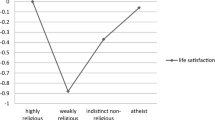Abstract
A European Social Survey (ESS)—based study of Clark and Lelkes on the European level showed a double positive connection between religion and life-satisfaction: not only did a personal involvement have a positive impact, but there was also a regional externality. Even atheists seemed to be happier in areas with many religious people. However, the regional structure of the ESS can be seen as methodologically doubtful. We therefore replicated the study with more rich German data. In our study we confirm the positive individual effect of religion, but we did find a negative regional externality. However, further analysis revealed, this was an effect of an omitted variable: the degree of urbanization. In a more detailed approach we show that this effect is confined to areas with a protestant majority. We conclude that the positive degree of urbanization influence on life-satisfaction is presumably due to the chance for more political participation in the (protestant) city states in Germany.


Similar content being viewed by others
References
Bundesamt für Bauwesen und Raumordnung (2009). INKAR 2007—Indikatoren und Karten zur Raum- und Stadtentwicklung. Bonn.
Clark, A. E., & Lelkes, O. (2009). Let us pray: Religious interactions in life satisfaction. Paris.
Frey, B., & Stutzer, A. (2002). Happiness & economics. Princeton.
Grözinger, G., & Matiaske, W. (ed.) (2005). Deutschland regional. Sozialwissenschaftliche Daten im Forschungsverbund. Munich.
Harrell, F. E. (2001). Regression modeling strategies: With applications to linear models, logistic regression, and survival analysis. New York: Heidelberg.
Headey, B., Schupp, J., Tucci, I., & Wagner, G. G. (2010). Authentic happiness theory supported by impact of religion on life satisfaction: A longitudinal analysis with data for Germany. The Journal of Positive Psychology, 5(1), 73–82.
Heineck, G. (2002). Treasures in heaven? The relationship between religion, belief and earnings in Germany. Bamberg.
Jelen, T. G. (2005). Religion and politics in the United States: Persistence, limitations and the prophetic voice. Social Compass, 53(3), 329–343.
Koenig, H. G., McCullough, M., & Larson, D. (Ed). (2001). Handbook of religion and health. Oxford.
Meulemann, H. (2004). Religiösität: Die Persistenz eines Sonderfalls. In J. W. van Deth (Ed.), Deutschland in Europa. Ergebnisse des European Social Survey 2002–2003. Wiesbaden: VS Verlag für Sozialwissenschaften.
Myers, D. G. (2008). Religion and human flourishing. In M. Eid, R. J. Larsen (Ed.), The science of subjective well-being (pp. 323–343). New York.
Norris, P., & Inglehart, R. (2004). Sacred and secular: Religion and politics worldwide. New York.
Prognos (2008). Engagementatlas09. Basel.
Snoep, L. (2008). Religiousness and happiness in three nations: A research note. Journal of Happiness Studies, 9, 207–211.
Tiryakian, E. A. (1993). American religious exceptionalism: A reconsideration. Annals of the American Academy of Political and Social Science, 527, 40–54.
Traunmüller, R. (2008). Religion as a resource: Individual religiosity, religious context and the creation of social capital in Germany. In 8th international German socio-economic panel user conference, Berlin.
Author information
Authors and Affiliations
Corresponding author
Rights and permissions
About this article
Cite this article
Grözinger, G., Matiaske, W. The Direct and Indirect Impact of Religion on Well-Being in Germany. Soc Indic Res 116, 373–387 (2014). https://doi.org/10.1007/s11205-013-0308-9
Accepted:
Published:
Issue Date:
DOI: https://doi.org/10.1007/s11205-013-0308-9




